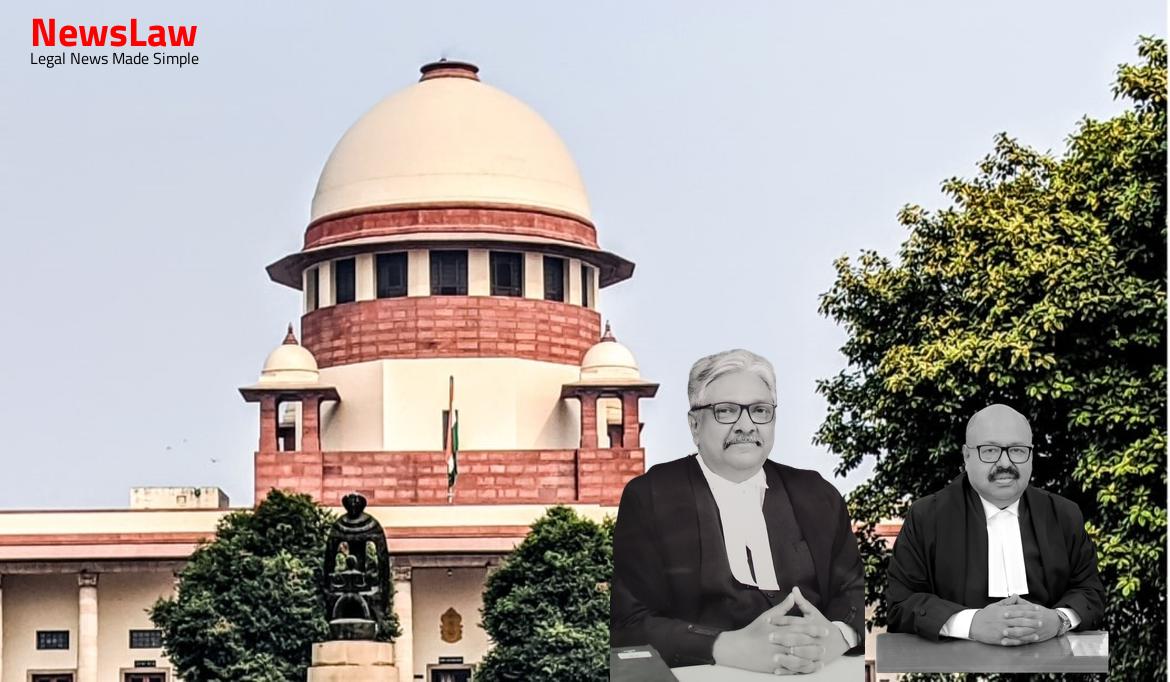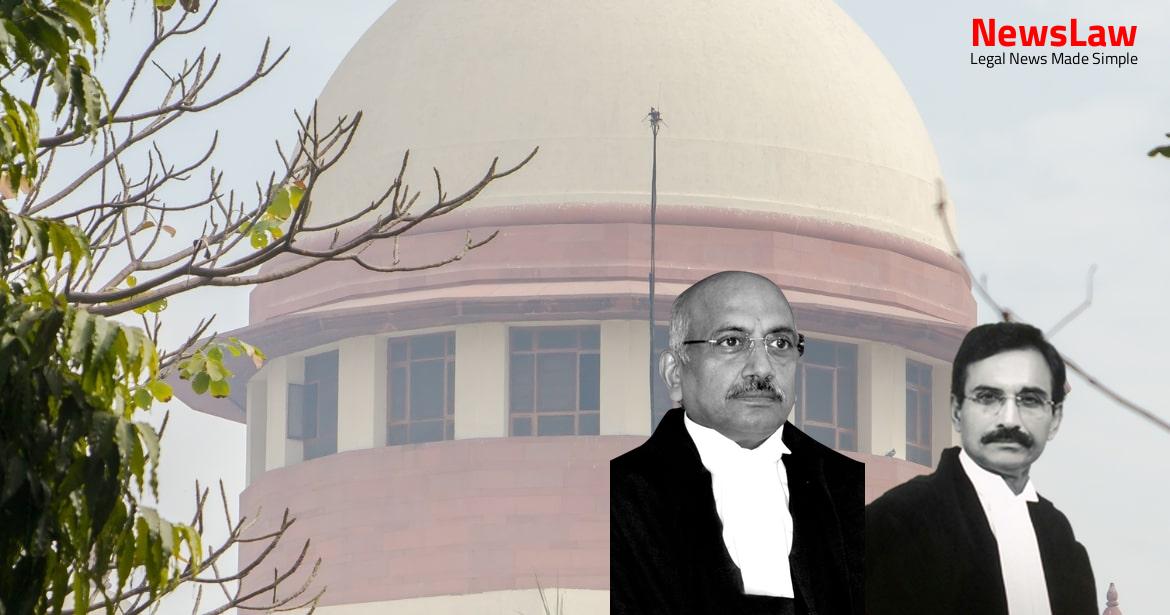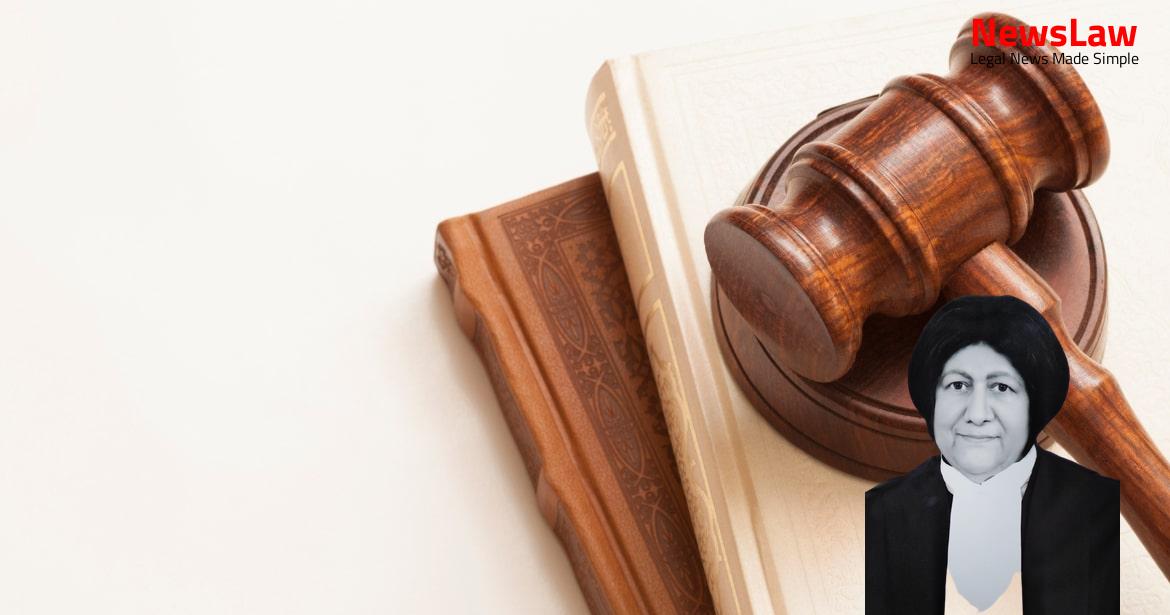In a recent landmark judgment by the Supreme Court of India, a resolution to a land sale dispute was provided. The case involved a dispute between the plaintiff and defendant sister concerns regarding lands in Village Wadiwadi, Subhanpura, District Vadodara. The court’s decision sheds light on the complexities of contract law and equitable relief sought by the parties involved.
Facts
- The plaintiff filed two suits for declaration and specific performance against the defendant sister concerns regarding lands in Village Wadiwadi, Subhanpura, District Vadodara.
- Plaintiff claimed a concluded contract for the sale of lands for specific sums, having paid a token amount and being ready with the balance.
- The plaintiff sent an email of acceptance of the draft MoU on 30.03.2018, which was received by the defendant later in the day.
- The plaintiff issued a public notice on 03.04.2018 regarding the property, while the defendants refuted it through a notice on 04.04.2018.
- Despite acknowledging refund and signing an agreement for sale with defendant no.2 on 31.03.2018, the suit was filed over 7 months later.
- The cause of action in the suit is based on the email dated 30.03.2018 and the public notice dated 03.04.2018.
- The plaintiff was ready and willing with the balance amount on 30.03.2018, enabling the lifting of attachment orders by the Income Tax department.
- The appellants filed separate appeals before the High Court, challenging the order of injunction which was affirmed.
- Further payments were made by defendant no.2 till 16.01.2019, aggregating a significant sum.
- The High Court affirmed the order of injunction based on the communication of acceptance to the draft MoU sent by e-mail on 30.03.2018.
- The exchange of WhatsApp correspondences between the parties was considered as part of the concluded contract.
- The Principal Civil Judge held that the terms and conditions for sale were finalized by the e-mails dated 29.03.2018 and 30.03.2018.
Also Read: Expanding the Notional Extension Theory: A Legal Analysis
Arguments
- Shri Sibal argued on behalf of the defendant, stating financial difficulties as the reason for negotiating the sale of lands.
- Negotiations with the plaintiff did not reach a final agreement.
- The plaintiff’s delayed response to the final MoU draft was mentioned.
- Dr. Singhvi, representing the plaintiff, stated that they were willing to meet Income Tax liabilities of the defendant.
- A plea of delay was raised by the defendant in response to the injunction application.
- Concurrent findings by the Special Civil Judge and the High Court favored the plaintiff.
- The deal with another party was finalized after it was clear the deal with the plaintiff was not progressing.
- Various legal cases were cited in support of arguments.
- The registered agreement for sale and possession delivery were done before the suit was filed.
- The defendants’ haste in finalizing the deal was noted, implying harm to the plaintiff.
- The plaintiff’s acceptance and protest of refund were highlighted.
- The contention that the agreement execution was just a formality was disputed.
- Delay in institution of the suit did not induce the defendant to take further action to their prejudice.
- Plaintiff is willing to pay the defendant no.2 the amount of Income Tax dues and proceed with the contract with defendant sister concerns.
Also Read: Analysis of Intent in Fatal Assault Case
Analysis
- The plaintiff failed to establish a strong prima-facie case for temporary injunction in a suit for specific performance.
- The use of the words ‘final draft’ in the email dated 30.03.2018 cannot solely determine a concluded contract.
- The delay in instituting the suit and lack of immediate action by the plaintiff affected the balance of convenience.
- The negotiations between the plaintiff and the defendant were reflected in multiple emails exchanged between them.
- The conduct of the plaintiff was a relevant consideration for the injunction, as they were aware of ongoing negotiations with the defendant.
- The High Court failed to address the issue of delay in the institution of the suit, which was a crucial factor in the case.
- The court refrained from making findings on the merits of the suit to avoid prejudice to either party.
- Various payments made by defendant no.2 indicated the evolving nature of the contract and lack of mutuality between the parties.
- Irreparable injury must be material and not necessarily physically irreparable in cases of granting injunctions.
- The balance of convenience and substantial harm to parties were critical factors in deciding whether to grant the injunction or not.
- The existence of a concluded contract between the parties was left for trial to be determined based on evidence.
- Litigation at the initial stage of injunction stalled the progress of the suit, emphasizing the complexities involved in the case.
- Section 36 of the Specific Relief Act, 1963 provides for preventive relief in such cases.
- Satisfaction of prima facie case alone is not sufficient to grant an injunction.
- Court’s discretion against the plaintiff is based on the conduct or neglect of the plaintiff.
- Court may refuse to interfere if the party invoking jurisdiction is not blameless and caused the situation.
- Jurisdiction to interfere with temporary injunction orders is purely equitable.
- Mutuality in the contract is essential for the court to exercise discretion.
- Disqualifying circumstances can prevent the court from granting the relief prayed for.
- Rule of prudence in Wander Ltd. case is not absolute and facts of the case are crucial.
- Discretion in granting temporary injunction should be judicious and not arbitrary.
- Apart from prima facie case, balance of convenience, irreparable injury, and party’s conduct seeking injunction are important.
- Delay in filing the suit, party’s fault, and unfair dealings are considered in granting equitable relief.
- Nothing in the present order should be interpreted as an expression of opinion or observation by the court.
- The conduct of the involved party should be characterized by fairness and honesty.
- After careful consideration of the facts, it is concluded that granting an injunction to the plaintiff is not justified.
- As a result, the previous orders of injunction are revoked and set aside.
Also Read: Assessment of Compensation in Disability Case
Decision
- The appeals have been allowed.
- The High Court has already given directions to expedite the hearing of the suit.
- The court reiterates the direction for expediting the hearing of the suit.
Case Title: AMBALAL SARABHAI ENTERPRISE LIMITED Vs. KS INFRASPACE LLP LIMITED (2020 INSC 4)
Case Number: C.A. No.-009346-009346 / 2019



